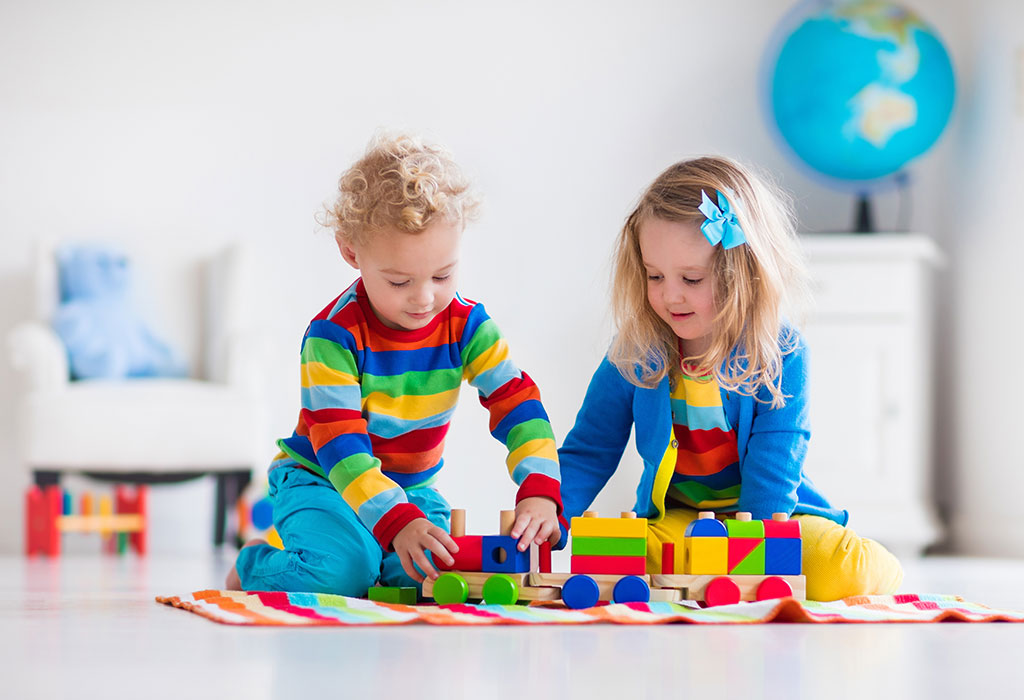


Before, the goal was to socialize by sharing a toy now the goal is to possess the toy by competing for it. As the toddler develops his sense of self, exhibited by the emergence of possessive pronouns like “I,” “me,” “my,” and “mine,” play with peers often deteriorates swiftly and cannot be sustained due to constant conflict. However, as the autonomous self develops between ages 2 to 3, sharing declines. At this time, peer play involves sharing uninhibited by possessiveness as the child prizes socializing over autonomy. The observant child is now aware that the other child is hurting and needs assistance. For example, if a child falls from the monkey bars, another child may cry to an adult. As children coordinate their actions in response to another child and share feelings, they become aware that other children have thoughts and feelings. These peer interactions begin the foundation of prosocial skills with others. Social play at this stage lacks imagination and is more focused on imitation of each other’s behavior, a shared interest in similar toys, and/or playing simple games like chase. They may enjoy doing the same thing in parallel, but they do not show evidence of sharing the same fantasy.

If you were to look in on a room full of toddlers, several of them might be at the same playing station, each consumed in their task without actively engaging the children around them. Playing alongside another child, both intent on similar objects of the play without direct interaction is known as parallel play. Solitary play is a child playing independently with no outside interaction. Play takes form in solitary play, parallel play, and social play. By the age of 2, a toddler’s engagement with others will extend to peers their same age, not just their caregivers. Symbolic play can be a vehicle for relief from reality. Pretend play extends to symbolic play, which is the use of one object for another. Pretend play is a direct imitation of ordinary activities. Between the ages of 1 and 2, imaginative or pretend play replaces sensorimotor play. During this age, pretend play is initiated with the imitation of ordinary activities like pretending to eat or imitating caregivers. Play starts “primitively” as sensorimotor play from 1 to 2 years with an exploration of properties and functions of objects. Play at this stage is repetitive and often ranges in intensity according to how the baby responds to the game. At this milestone, children begin using their caregiver for enjoyment in addition to comfort and security. Between the ages of 3 to 6 months, infants actively seek interaction with others and begin to play “baby games” like peek-a-boo with their caregivers. By 3 months, play progresses to regular smiling and cooing when a baby is face-to-face with a person. The earliest and most rudimentary indication of play is the social smile, which occurs at about 4 to 6 weeks of age. Play is prosocial and evolves as the child progresses through infancy and childhood. The purposes of play are to provide avenues to think and express emotions, consider alternative ways of viewing a situation, explore new ways of reacting to situations, provide outlets for imagination, and to understand cause-and-effect in relationships. Moreover, play creates opportunities for the development of cognitive skills throughout childhood development. It is an expected, normal process in children. My vote is nine.Play is the engagement of activity for enjoyment and recreation rather than for any set purpose. Nate is completely disturbed and the naive Rico is easily manipulated by the stripper Infinity. Brenda sees how difficult is to find a mate with the same sexual expectations. In this episode, Arthur feels offended by Ruth and leaves his job and lodging in the Fisher & Diaz. Claire convinces her family to burn what was left after a garage sale. Keith is the bodyguard of the star Celeste. Brenda was hoping to have normal sex with Joe, but the guy wants kinky bad sex.

Nate, with a weird behavior, is having an affair with the mother of one of Maya's friends. Claire goes to a party with Anita, and finds that Edie is lesbian. Sophia manipulates the silly Rico, trying to get a new surgery on her breasts. Ruth blames Arthur of sending excrement because of his harm feelings he becomes upset, quits his job and leaves the house, leaving David and Rico alone. Meanwhile, George receives a beautiful package with feces boxes. Rico teaches Arthur how to embalming, while David buys a new suit for him. While making a prank through the telephone, the fourteen years old Kaitlin Elise Stalte falls off her bed and dies.


 0 kommentar(er)
0 kommentar(er)
